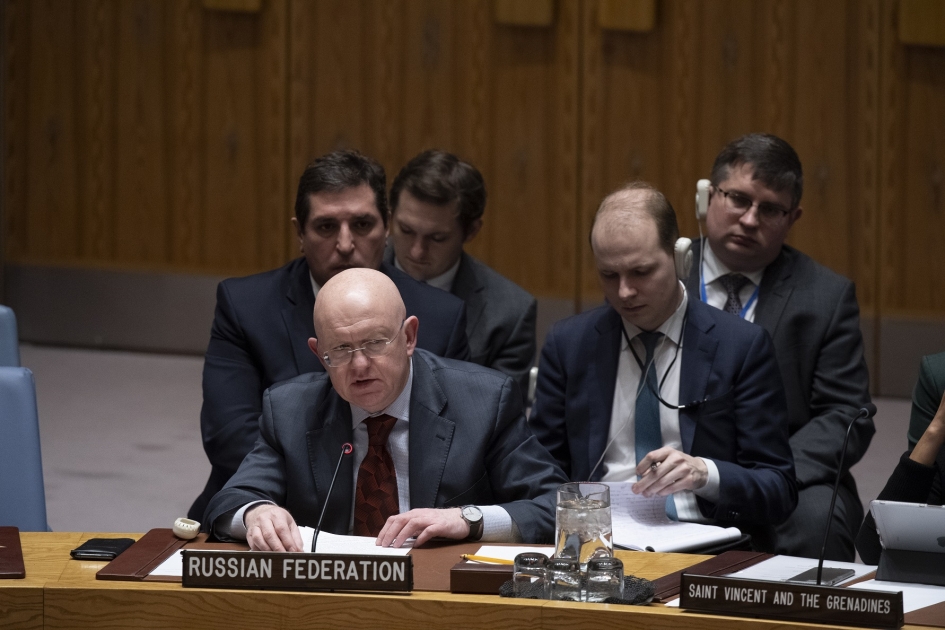Statement by Permanent Representative Vassily Nebenzia at a UN Security Council briefing on Syria (political aspects)
Mr. President,
We thank Deputy Special Envoy of the Secretary-General for Syria Ms. Khawla Matar for the briefing.
In the morning we had an opportunity to discuss the humanitarian situation in Syria. We cannot but repeat our call addressed to the Western donors that asks to abandon double standards in providing humanitarian assistance.
Despite the trend for stabilization in Syria, there is yet much work to do at various tracks. What begs our greatest attention is the political process. Russia remains committed to the principle of peaceful settlement of the Syrian crisis by political and diplomatic means. In order to promote this process under UN auspices, the Constitutional Committee was established. Launch of the Committee was only possible thanks to the game-changing contribution of the Astana format.
We give a high assessment to the approach of G.Pedersen and his team that is aimed at creating conditions that would let the negotiators develop a culture of dialogue and trust to each other. This is what it takes among other things to be successful at this track.
24 January Moscow hosted productive and meaningful meetings of the Special Envoy with Foreign Minister S.Lavrov and Defense Minister S.Shoigu. These meeting discussed ways to galvanize joint work both in Geneva and in the Astana format, where Russia, Turkey, and Iran have set up successful interaction. We have expressed our full support for the efforts of G.Pedersen.
Another important meeting is the current visit of G.Pedersen to Damascus where he will have an opportunity to discuss prospects of convening another round of consultations of the Constitutional Committee. Just like the Special Envoy, we do not over-dramatize the fact that during the couple of months after the Committee was launched no grandiose results have been achieved yet. This is natural. We believe it counter-productive to over-dramatize the situation and pinpoint those who should be blamed. We will assist in creating favorable conditions for the progress during the next session of the editorial commission, whenever such session is possible.
Mr. President,
Another priority task is fighting against terrorism in Syria, where Idlib and hostages kept there remain terrorists’ last stronghold. Militants from 'Hayat Tahrir al-Sham’ and their associates do not observe the cessation of hostilities. Early in January this year, Russia and Turkey proclaimed a ceasefire. However, terrorists violate it daily. The target of their attacks and of fire from various sorts of weaponry is the Syrian army, civil facilities, and the Russian air base in Khmeimim. By all means, such armed provocations cannot be left unanswered.
We have long been talking about the need to separate armed opposition (if there is still any of it present in Idlib) from terrorists as soon as possible. At the same time we cannot but be concerned by terrorists spreading from Idlib to other parts of Syria, penetrating other countries –Iraq, Afghanistan, and Libya.
We would also like to make a point about the notes of the Permanent Mission of Syria to the United Nations, and Media publications regarding terrorists’ plans to set up more provocations and staged chemical incidents in Syria. Those signals are very alarming. We know too well how those stagings are used for military and political goals.
Another vital track of the work on Syria that has its bearing on the political process and on the efforts to improve the humanitarian situation is interaction of Moscow and Ankara in terms of implementing the Memorandum of 22 October in the interests of preventing armed clashes in the North-East of Syria. The Russian side continues to assist in establishing contacts between Kurds and Damascus, thus correcting the damage inflicted by the illegal occupation of this area and the dangerous experiment of demographical engineering that was carried out there.
Mr. President,
In conclusion, let me briefly touch upon one more aspect. Yesterday Washington publicized its “vision” of the Middle Eastern settlement. I will not go into detail now, because this document requires close study and a separate discussion in the future. However, we could not fail to notice that the maps attached to the plan refer to the Golan Heights as a territory of Israel. Therefore, we would like to remind those geographers who made the map that UNSC resolution 497 does not recognize Israeli sovereignty over the Golans. The Golan Heights are an illegally occupied Syrian territory.
Thank you.
